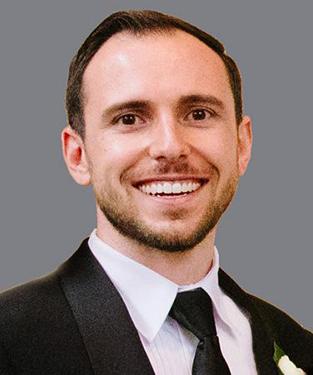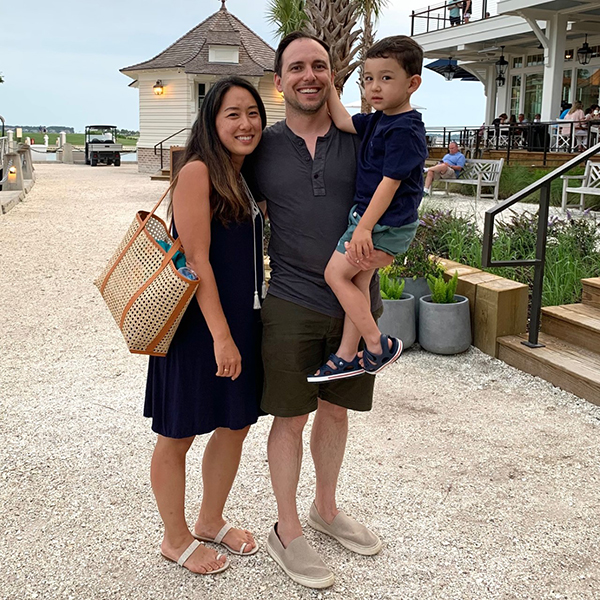
Jeffrey Russ, MD, PhD has had a lifelong interest in both neuroscience and neurology, and it was his interest in brain development that led him to a clinical interest in pediatric neurology. He talks about his focus on basic neurodevelopment research and his eventual goal to run an independent translational neuroscience lab that studies the neuron and circuit-specific effects of perinatal brain injury. He also provides some valuable advice for trainees and shares his love for building Legos, going to the playground, and having swordfights with his four-year-old son.
How long have you been at Duke? How did you decide to come here?
I came to Duke in July, 2021, just over a year ago, and am thankful to be here! As I neared graduation from child neurology residency at UCSF, several things factored into my family’s decision to move to North Carolina.
Academically, I was looking for an institution where I could pursue neonatal neurology clinically, while also pursuing mentored basic science. I needed to find an institution with the unique combination of a strong reputation in pediatrics, pediatric neurology, neonatology, and neuroscience; few places meet all those criteria, but Duke fit the bill!
From a family perspective, we have a four-year-old son and desperately needed to escape the high cost of living in the Bay Area. My wife had gone to law school at UNC (setting up an all-too-common intra-family rivalry…), and had always wanted to move back to the area. We love it and we haven’t looked back!
What are your current responsibilities in the Department of Pediatrics? What does your typical day look like?
Currently, 20% of my effort is spent on inpatient and outpatient pediatric neurology, with an emphasis on neonatal neurology. I see mostly infants and toddlers who graduated from the ICN and have structural brain malformations, perinatal brain injury, genetic disorders, neurodevelopmental disorders, and epilepsy. When I am on inpatient service, I attend on our neurology consult and neurocritical care services. I also participate in our Neuro-Intensive Care Nursery (NICN) collaborative where I am thankful to learn from our wonderful neonatologists, nurses, and therapists!
The other 80% of my time, I focus on basic neurodevelopment research in the lab of Dr. Josh Huang in neurobiology. Our lab generates novel genetic tools for investigating the development of neurons in the cerebral cortex, the part of the brain that underlies our complex human cognitive abilities and is impacted in perinatal brain injury and neurodevelopmental disorders. My eventual goal is to run an independent translational neuroscience lab that studies the neuron and circuit-specific effects of perinatal brain injury while seeking biomarkers and potential therapeutic targets.
How and when did you initially become interested in medicine? What made you decide to pursue a career in pediatric neurology?
I have been interested in neuroscience and neurology for almost as long as I can remember. In fact, I believe it was on a drive to tour Duke as a high school student that I definitively decided, “I want to study the brain.” To me, the abstract questions in neuroscience – How do circuits generate behavior? What is consciousness? What underlies complex developmental and psychiatric disorders? – are the fascinating entry point to neuroscience, and yet we are still so far from answering these questions. So instead, a methodical approach to understanding brain development seems to me like a promising way to begin to understand brain organization and disorganization in disease. It was my interest in brain development that led me to a clinical interest in pediatric neurology. While people sometimes observe how sad and severe pediatric neurological disorders can be, I see it the other way around – unlike many adult neurological disorders, children often compensate and recover much better than expected, which to me is a testament to the amazing plasticity of the developing brain!
What do you see as the biggest current challenges and opportunities in the field of pediatric neurology?
Though the blueprint for our entire brain is programmed into our genetic code, we have a very limited understanding of how individual neurons acquire their identity, how they wire with precision, and how these circuits mediate complex thought and behavior. When it comes to neurological disease, we are good at understanding anatomy by using imaging or population-level electrophysiology by using EEG, but we still have so much to learn about how specific neuronal circuits are altered, especially in complex disorders, such as perinatal brain injury, neurodevelopmental delay, and autism. Furthermore, our therapies, though helpful, are very non-specific (i.e. total body cooling for HIE, or physical therapy for cerebral palsy). Thus, I think the next major leap for pediatric neurology will be trying to understand neurodevelopmental diseases at the level of specific neuronal populations and microcircuits, and then performing large-scale, bioinformatic screens for neuron-specific biomarkers and circuit-targeted therapeutics.
Can you tell us about the research you are currently involved in?
I work in Dr. Josh Huang’s lab in neurobiology. The goal of the lab is to develop novel tools to probe the molecular regulation of cortical development, linking early neuronal gene expression with mature neurons’ downstream functions. The Huang lab uses mouse genetics, in vivo calcium sensitive imaging, viral neuronal labeling, and single-cell transcriptomic and epigenetic methods to understand cortex development. I am currently applying these tools to mouse and human cortical tissue to understand the selective impact of perinatal hypoxic-ischemic encephalopathy (HIE) on vulnerable neuronal subpopulations, with the hope of eventually identifying molecular pathways that might be useful for targeted therapeutic intervention after HIE.
Who was your most significant mentor and what knowledge did you gain through this collaboration?
I am grateful for my many generous and effective mentors throughout my training, but I would have to say my most significant mentor was my thesis advisor, Dr. Julia Kaltschmidt. Not only did she nurture my scientific development when I was a nervous newcomer to molecular biology, but she also leads by example – she is a hard worker and a thoughtful scientist, she fosters a sense of lab community, and though her passion for academic research is indefatigable, she also does not hide the challenges and difficulties of being a junior faculty member trying to establish an independent research lab. I owe much of my own perseverance to having her as a role model.
You received your MD/PhD from Cornell University, Weill Medical College and completed your residency at UCSF School of Medicine. Do you have any advice for trainees?
Probably the most frequent advice I find myself giving junior trainees is that mentorship matters. Often that doesn’t mean going for the biggest names or the flashiest opportunities; instead that means finding a mentor with a similar workstyle, a similar outlook on academics, and a personal investment in your success. Mentorship should be the primary priority when choosing an institution, a residency program, a lab, etc., even over subject matter. With the wrong mentor, you can easily come to hate something you thought you loved, and with the right mentor you can really come to love something you didn’t initially expect.
What passions or hobbies do you have outside of Duke?
Now, as a working father with limited time, I would say my hobbies have come to mirror those of my four-year-old son: building Legos, going to the playground, and having swordfights. But in the rare moments where I pursue my adult hobbies, they include skiing, swimming, playing guitar, and going to concerts. My wife and I have also jointly gotten more into home improvement and gardening than we ever would have expected.
